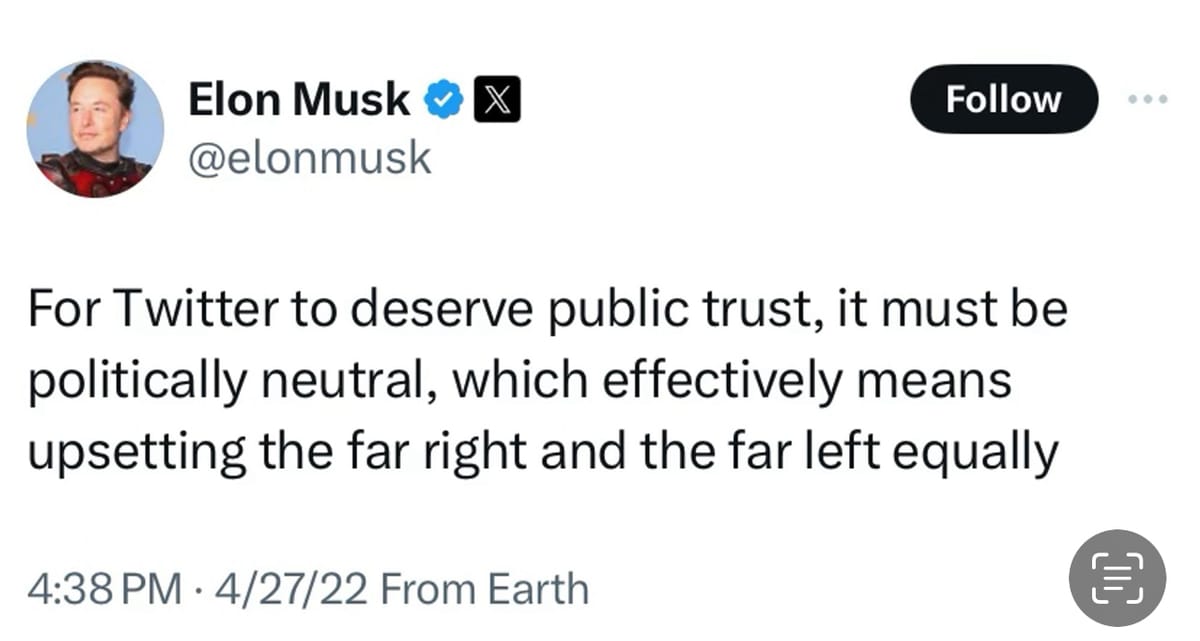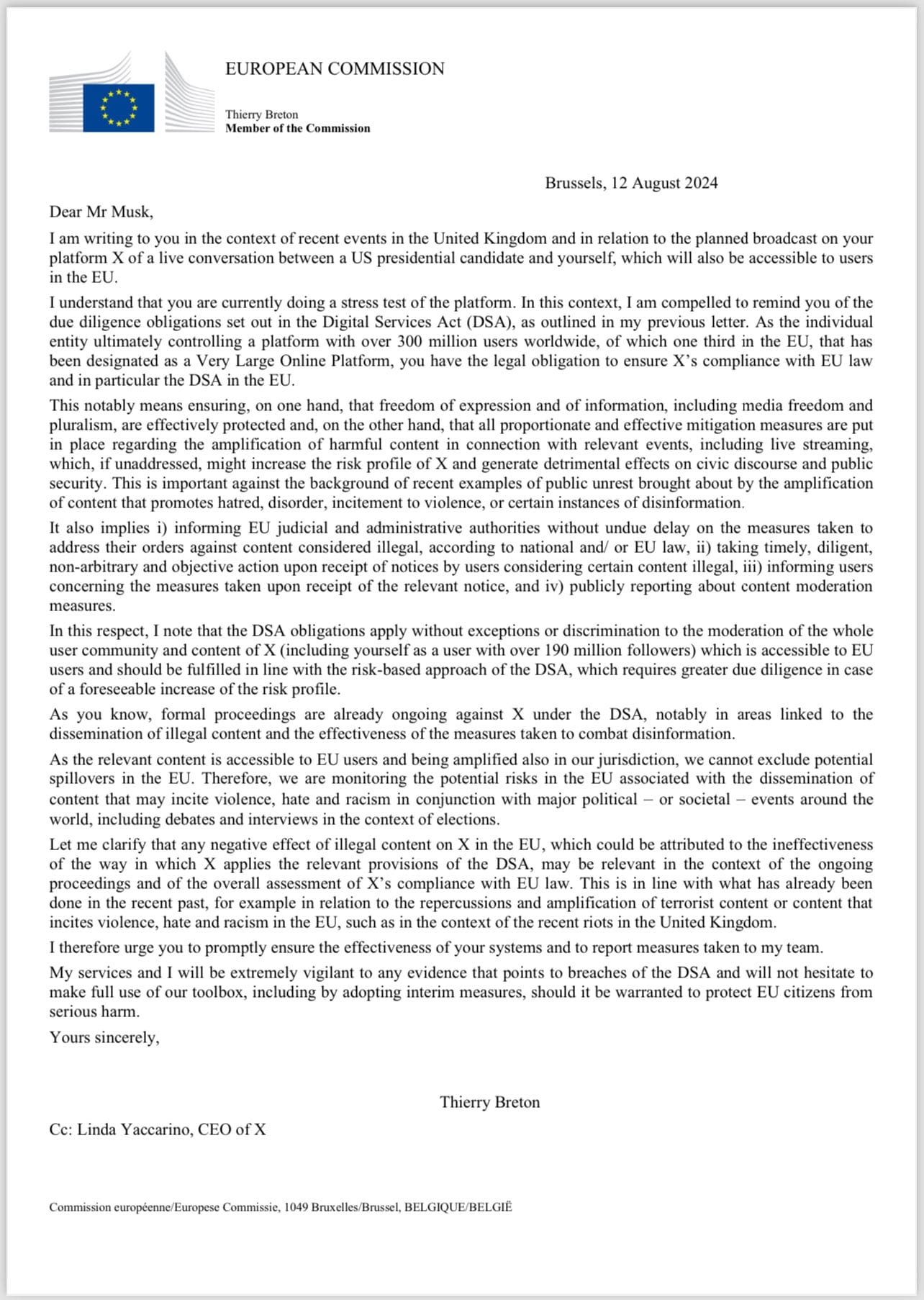If X and Musk are not politically neutral, democracies need to act to mitigate the growing risks.

Good afternoon from summertime Washington, where I am writing this dispatch along the Anacostia River. Alex Howard here, with another civic text.
Thanks to everyone who has subscribed and amplified this series so far, particularly the folks who have signed up for a paid membership. This newsletter will need to keep growing to be sustainable without another source of subsidy. If these prove valuable to you, please recommend Civic Texts and share with others.
Today, I want to share a few more reflections about a story that’s growing in urgency and consequence.
A couple weeks ago, I shared the experience of finding myself in the New York Times after asking Elon Musk whether he was going to change X’s policy on synthetic media after he violated it by sharing a deepfake video of Vice President Kamala Harris without noting it was a parody. (As you might guess, he has not, though he’s mocked his critics.)
The episode showed that self-regulation is not enough: Tech companies should require disclaimers for media made with AI, & governments should codify that mandate through laws and rulemakings, like the one the Federal Communications Commission has begun — and the one the Federal Election Commission should have intiated years ago.
To state the obvious, Musk's behavior on the platform he bought over the last years has shown how, when, and why self-regulation will fail — at least with respect to the sysadmin of that microblogging website.
As I told the Washington Post, Elon Musk’s political advocacy has erased any trust in the platform’s neutrality & spotlights which accounts get restricted, suspended, supported, or promoted.
When still hasn’t sunk in, over a year, is what it means for the platform formerly known as Twitter to have changed this way, and how the world leaders, media, corporations, politicians, universities, celebrities, athletes, & hundreds of millions of other people who use it every month will adjust over time as it becomes clearer that neutrality has left the building.
We’re now living through in a dangerous moment headed to a pivotal presidential election.
A far-right tech magnate has direct control at a root level of real-time planetary communications infrastructure, fomenting division aroubd race, gender, and immigration on the platform he owns, unfettered by rules or policies remaining enforce upon others.
Musk’s power has precedents in newspaper barons like Hearst or tabloid and cable news owners like Rupert Murdoch, but Musk has entered unchartered territory for an owner of a tech company that operates a social media platform.
For decades, American tech CEOs have paid at least paid lip service to offering a platform to candidates from both major political parties, including dedicated teams to help presidential campaign use their services and onboard newly elected or appointed officials.
It was in their business interest to do so, of course, but there were nods to civic virtue and purpose in that first decade of modern social media.
Even if features and services catering to public sector accounts and the accessibility of their communities were slow to emerge, at least when compared to chasing ad dollars from corporations or the posts of celebrities to monetize, tech CEOs didn't personally endorse candidates, much less personally malign them with racist or misogynistic attacks.
That era is over. The mask is off. X’s CEO is not being subtle about his preferences.
In 2024, Musk has long since cast off any semblance of nonpartisanship — to the detriment of X as a business — and there seems to be no one left in his orbit able to suggest that doing so might be unwise for a national security contractor, the CEO of a major automaker, or the owner of a global social media platform.
Hypocrisy is no hindrance. Former Twitter trust and safety employees told Wired that “Musk’s increasingly partisan behavior around the US elections and other major events is a sign that he is doing exactly what he accused the company’s former leadership of doing: playing politics.”
To use a poker metaphor, Musk seems to be going “all-in“ on his fellow ideological travelers on the far-right around the world, perhaps betting that his wealth and influence insulate him from accountability to anyone in the marketplaces for ideas, investment, and advertising as he funds a super political action committtee, tweets and amplifies false or deceptive claims about elections, and hosts the candidates he favors in livestreams, like tonight.
As was true during the Gilded Age, democracies will need to adapt and change to the times in the Silicon Age, as Thomas Jefferson once suggested to a young nation that had yet to emerge as a full democracy, of, by, and for all of its people.

The European Union has begun to do so, in adopting new laws and regulations to govern digital services and artificial intelligence, but has yet to meaningfully fine or constrain Musk or X, whose mockery in response to a letter sent by the EU today made clear his disdain for the power of that governmental entity.

The most important action the United States government can take is to stop ignoring Musk’s behavior and begin to insulate agencies against a capricious, thin-skinned billionaire, starting with shifting unique agency activity off of X and crafting a 21st communications policy that ensures no one has to use a given private platform to read official statements or interact with elected representatives or appointed officials. (More on that later.)
In practice, that will mean mitigating the growing risks associated with key points of control that Musk has gained over satellite Internet access on Starlink, global communications on X, and space travel on SpaceX by ensuring the United States government has alternatives. That won’t happen right away, but it’s incumbent on administrations to look years ahead, not just at polls or market today.
It will likely take an even clear break from democracy by Musk — perhaps this fall — to provoke a more robust policy response in Washington to a tech oligarch putting a thumb on the side of far-right authorItalian governments that don’t run afoul of our Constitution.
More radical actions like “nationalizing satellite Internet delivery systems like Starlink” as professor Siva Vaidhyanathan proposes or forcing Musk to divest from SpaceX should be on the table as a last resort, though our currrent politics in the United States have not allowed an Overton window to open such remedies yet.
In the interim, the White House should stop abdicating its responsibility to govern communications and tech policy and rally American tech CEOs to support pro-democracy features and services, and to oppose authoritarian abuses of them.There are some values they shouldn’t be neutral on.
Encourage American CEOs to be pro-democracy, making the case that property rights, civil liberties, and human rights are good for business in the long-term.
Although centuries of robber barons finding cause with fascists and colonial powers has shown how fortunes can be made without doing so, there are larger externalities that matter.



